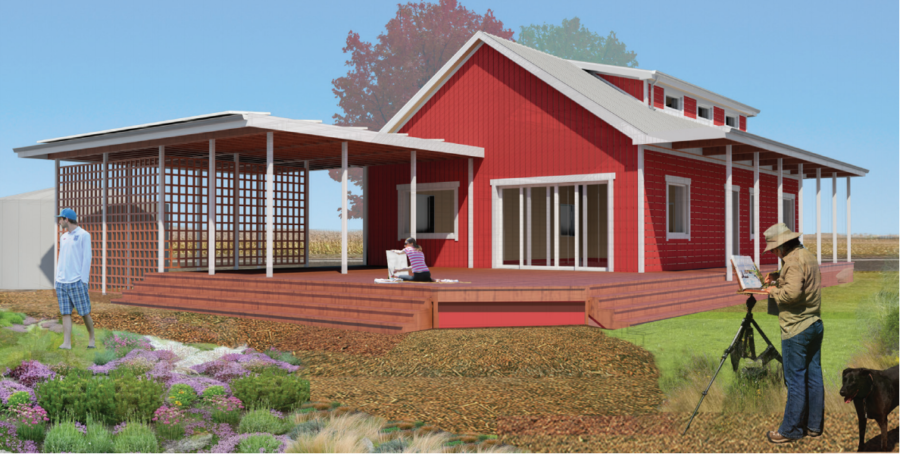?Team Illinois named Grand Winner Finalist in Department of Energy competition
A rendering of Team Illinois’ cottage. The cottage is being created as part of the Race to Zero competition.
May 25, 2015
Race to Zero is an annual competition open to students and faculty from various universities across the country. The competition has teams of students and faculty design an energy-efficient household.
Since 2007, the Illinois Solar Decathlon has participated in events sponsored by the U.S. Department of Energy, like the Solar Decathlon. Their participation in the Solar Decathlon led them to competitively design and build energy-efficient homes in China.
Team Illinois is composed of 28 undergraduate and graduate students at the University, who are majoring in engineering and architecture. The team started in September and was divided into six sub-teams, focusing on Architecture, Energy Analysis, Electricity, Light/Appliance/Home Automation, Water and Finance/Construction Management.
While the U.S. and Chinese Solar Decathlons involve the construction of an energy-efficient home, Race to Zero focuses more on design.
Get The Daily Illini in your inbox!
“We knew the competition was going to be stepped up from last year,” said Michael Replogle, leader of the electrical engineering sub-team of Team Illinois. “There were around twice as many teams.”
In this year’s competition, 33 teams from 27 national universities competed to create the most efficient, high-performing home and present it to the U.S. Department of Energy.
The presented project from Team Illinois was titled the “Sun Catcher Cottage.” The project involved the renovation of an already-existing farm cottage in Monticello, close to Allerton Park. They designed a single-family home with self-sustainable water supply and energy.
Cooperation also went beyond teammate interaction, as Team Illinois reached out to corporations such as Skidmore, Owings & Merrill for consultation on designs and architecture.
“Our scope for this project was to design a deep-energy retrofit,” said the project’s lead architect, Ryan Christensen, “to take an existing building and renovate it to net-zero standards.”
Today, Illinois Solar Decathlon feels that this success shows their true potential.
“It feels great,” Christensen said. “One of the things we pride ourselves in as an organization is that we’re student-led and student-run. … The fact that with a group of students ranging from freshmen to graduate students we’re able to have this success was very promising for us.”
Looking toward the future after the success in Race to Zero, Team Illinois is taking time to strengthen and prepare for the United States Solar Decathlon project in 2017.
“We want to make the RSO stronger,” said Assistant Project Manager Connor Bogner. “But come 2017, we’ll be wanting to win, and so this longer time span will give us a chance to get our RSO built to where we want it. … We’re pretty driven to get a first-place title. I believe in our team.”






